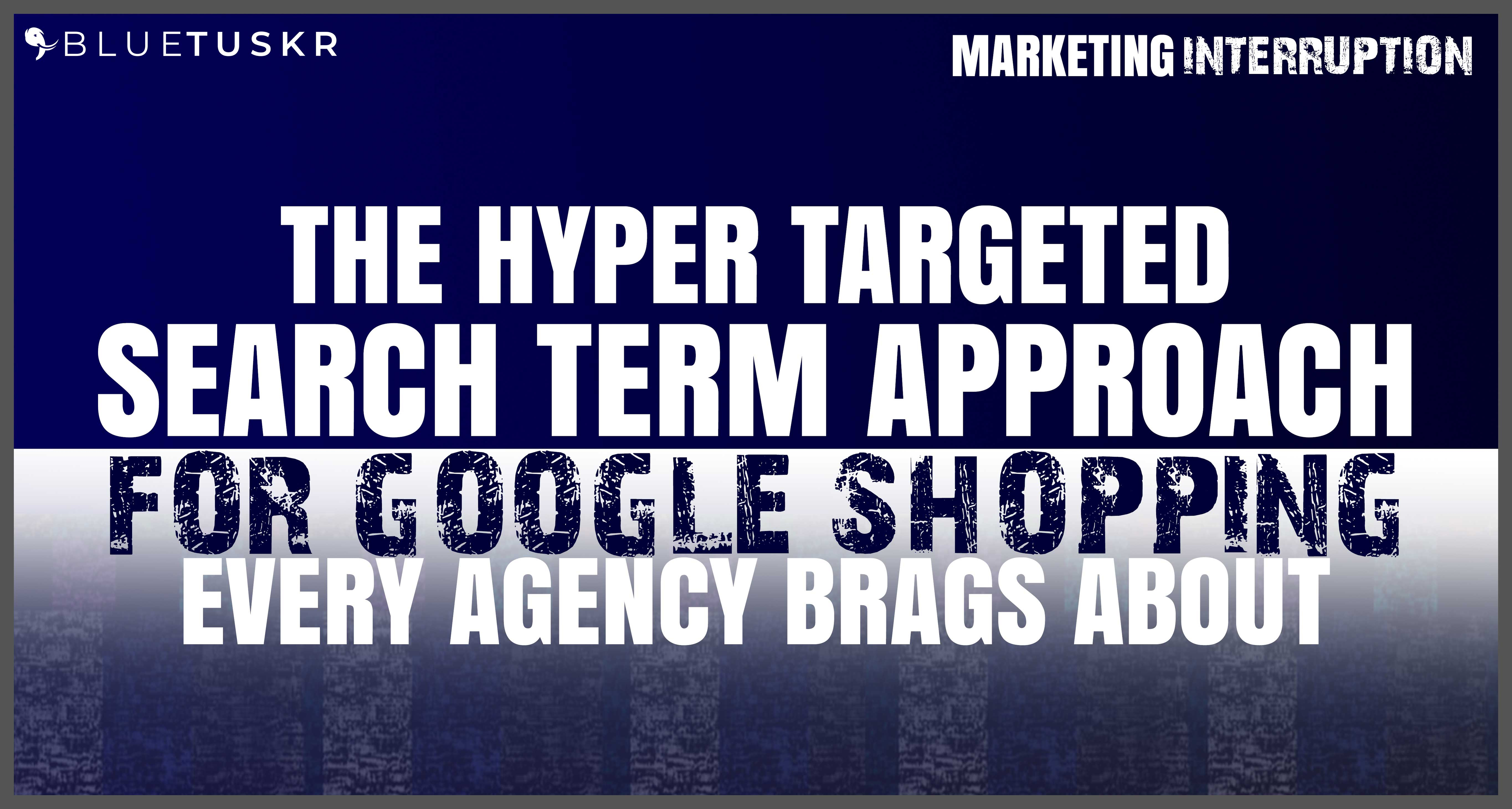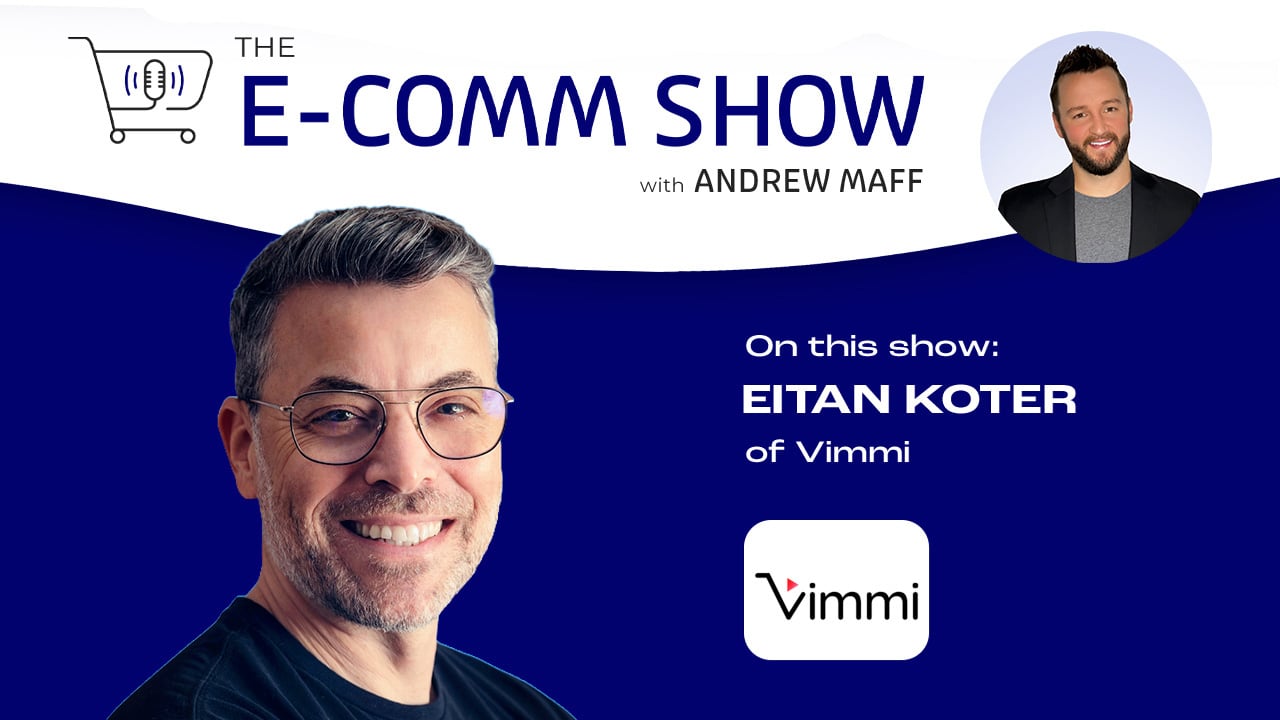Google Shopping Hyper Targeted Search Terms Agencies Brag About

On the 19th episode of Marketing Interruption, your host Andrew Maff discusses the keyword targeting strategy that all paid advertising agencies for e-commerce sellers brag about and gets into it's simplicity. He discusses the campaigns you should create and how they negate keywords while leveraging different priority campaigns to have more control over bidding on specific keywords. He also touches on the importance of optimizing Google Merchant Center.
Tune in and enjoy today's interruption!
MENTIONED IN TODAY’S EPISODE:
LEAVE SOME FEEDBACK:
If you enjoyed the show, please be sure to rate and review!...and of course, SUBSCRIBE!
Have an e-commerce marketing question you'd like Andrew to cover in an upcoming episode?Email: marketinginterruption@bluetuskr.com
CONNECT:
BlueTuskr.com | AndrewMaff.com | Twitter: @AndrewMaff
00:42
Hello, and welcome to episode number 19 marketing interruption Andrew Maffettone host by now hopefully you know me So today, I'm probably gonna get a little heated because this one, this one off so I'm talking about the like super hyper ultra mega targeted keyword search query funneling bullshit that agencies brag about. So, obviously, as an agency, I will say that we do this. And I will say that we don't have a fancy term for it, we just call it our shopping campaign strategy. But I've heard some ridiculous names for this, which honestly, is the correct way to run Google Shopping ads. So you don't really need to give it a fancy name. But I digress. So here's how this is done. Right. So you're going to start with a high priority campaign and a medium priority campaign. Then you're going to take a product line that is very similar to itself. So you're not going to question the search terms that are showing up. So again, I film a bunch of these at once. So my dog's been laying there the whole time. So we're gonna do dog toys. So I have golden retriever specific dog toys that I'm running, right? So I'm going to have a high priority and a medium priority campaign with all my Specific golden retriever dog toys. So that when, when an ad shows or I'm sorry, when a search term shows up, I'll know these are all my golden retriever dog toys, if they're not searching something like that, it's not a keyword I want. So you have your high priority, medium priority, high priorities, gotta have a decent budget doesn't have to be massive, but you're gonna get a lot of broad stuffing and a lot of crap in there. This is where you're doing your discovery, you're searching your medium priority, you're gonna have a little bit more success, you're gonna have those bids a little bit higher, and you're gonna want to give some room on that budget. So basically, what's going to happen is, let's say we're doing branded keywords. So, Andrews dog toys probably isn't good because it's kind of a bad brand name. But let's let's say it's BlueTuskr right? So we BlueTuskr Golden Retriever dog toys. So if someone searches BlueTuskr for dog toy, it's going to show up in my high priority, I'm going to negate that keyword, which will cause it to drop down into the Medium priority. So now it's going to show up in the medium priority. So next time someone searches BlueTuskr dog toys, it's going to show up in the medium priority, I have that bid up higher now. So I'm going to start to own that keyword. As those start to do well, you're going to constantly just negate things out of the high priority, this is why your high priority, you're gonna want to keep that budget relatively low. And you're going to keep those bids relatively low, because it can definitely get out of hand. And once you get it to running really, really well, you're going to want to keep that CPC as low as possible in the higher priority because you're basically going to take all the good stuff and move it down into the medium priority. So now by then all of your branded keywords are in the medium priority. And all of your top performing keywords are in the medium priority, then you're going to replicate the same concept. So if it starts to do well, in the medium priority, let's say you have some really better performing branded keywords and you have some really better performing just more general keywords and they do really well. You're going to negate those and you're going to drop those into a low priority. So usually what I'll do is I'll create a high and a medium priority and let it bake, get my data and if you've ever done this before, and then after I've got my data, I'm ready for it, then I will create my low priority, that one big budget, big bids on these keywords. So this is basically that funnel concept that these agencies brag about. So you basically gotten this keyword down as low priority, you've jacked it up. And now you'll see over time, in that low priority campaign, that's the only keyword that's in there, it's the only thing you're bidding on. So that's how they specifically bid on these one, individual keywords. And as you just start to shove more and more keywords down into the funnel, it works down there. So obviously, the only other side of this is you need to make sure that you're always adjusting your day time, state audience device, all that stuff, you need to make sure that you're adjusting those bids. I like to do that on close to a monthly basis. It kind of depends on the size of the account if I'm getting a ton of data Often and we're spending a good amount of money, I'll usually do it every couple weeks, but usually slightly newer ones where they're spending like maybe 10k or less "ish" a month. I'll do it just once a month.
05:13
That's all I wanted to talk about today. And then I'm going to feed your Google Merchant Center, just because I know it's kind of a tool. To me, it still counts as a tool. A lot of shopping ads. People say that, oh, they don't work. Well. For me. That's not true. They work well, for all e-commerce sellers, you just have to really narrow down that keyword that you're going after. But the one thing I've learned is that a lot of people will just shove their stuff into Merchant Center and let it go straight to ads, and they don't optimize it at all. So you need to go into Merchant Center and set up reviews, set of promotions, if you can, if you offer free shipping, make sure that that's mentioned but make sure that you optimize everything you can and Merchant Center. But that's everything I was gonna talk about today. So rate review, subscribe, all that fun stuff, and I will see y'all
CONNECT WITH OUR HOST
AndrewMaff.com | Twitter: @AndrewMaff | LinkedIn: @AndrewMaff
Connect With Us
Recent Post

.png)







.jpg)
.jpg)

.jpg)


Tell us what you think!